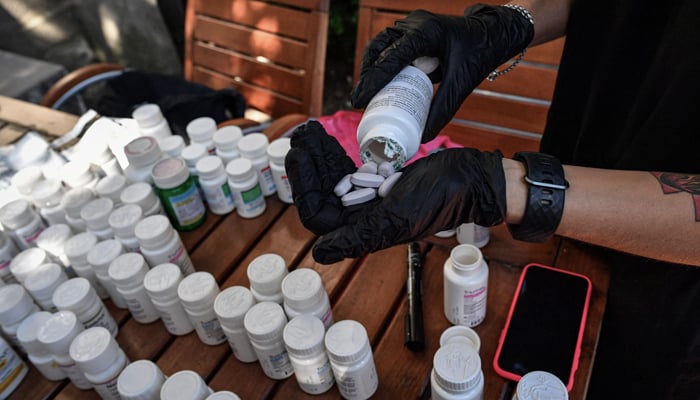‘HIV in drug users in country alarmingly high’
LAHORE: The Ministry of National Health Services, Regulations and Coordination, Islamabad, has revealed that, over the last decade, the HIV is concentrated in certain key populations like injecting drug users and transgender.
‘The HIV in drug users in Pakistan is alarmingly high,’ said Naeem Malik, a representative of Ministry of National Health Services Regulations and Coordination (NHSR&C), at an ‘Awareness workshop on drug use and HIV’ held in collaboration with Ministry of Narcotics Control (MONC), UNODC, UNDP, UNAIDS and WHO here Thursday.
The purpose of this workshop was to create awareness among health journalists about drug abuse, AIDS, HIV prevention among people who inject drugs (PWID), harm reduction and Opioid Assisted Maintenance Treatment (OAMT).
Dr Farrukh Mehmood, UNODC, said that the workshop was organised to create awareness on drug use and drug use related HIV, the various interventions/approaches for drug dependence treatment and prevention of HIV and blood-borne infections transmission among PWID. Naeem Malik, Ministry of NHSR&C presented a brief background of HIV and AIDS epidemic in the country and shared other dynamics of this deadly and silent disease. He said the government was committed to control the disease and putting all resources with the support of provincial AIDS Control Programmes as well as UN partners and Global Fund for fighting AIDS, TB and Malaria. He said the meeting was organised to share details of OAMT initiative which is related to address the issues regarding drug users.
The participants were briefed that drug use has social and economic impact on families, society and country. The family of the drug user is socially isolated because of the stigma attached to drug use. Increased crime is also associated with drug use. Children of families whose any member is drug addict are vulnerable to drugs. Drug use increases the burden on health services, not only related to their drug treatment but also other health problems, including Hepatitis B and C and HIV. As drug problem requires a comprehensive multi-sectoral response from various departments/sectors.
There is a serious need to raise awareness about drugs prevention. MONHSR&C, MONC and UNODC have developed ‘Drug treatment protocols’ and guidelines’ for Pakistan. Several trainings based on the treatment guidelines were arranged for the treatment centres staff from the government as well as NGOs run drug treatment facilities. Risk behaviors (including sharing syringes and sexual risk behaviors) of drug users increase their vulnerability to HIV. High HIV prevalence in people who inject drugs (PWID) shows that a lot needs to be done which includes increasing coverage of services for PWID.
World Health Organisation and UNODC, consider drug dependence a chronically relapsing health disorder which often co-occurs with other mental and physical conditions. Drug dependence is not a failure of will or strength of character but a medical condition that could affect anyone. Just like any other chronic health condition, such as hypertension or diabetes, the treatment of drug dependence requires a health-oriented response. Among pharmacological approaches, WHO and UNODC recommend countries to introduce and expand access to opioid agonist maintenance treatment (OAMT) for people with opioid dependence. OAMT involves use of a safe prescribed medicine, such as buprenorphine under medical supervision. The benefits of OAMT have been documented by the WHO, UNODC and UNAIDS, the main benefit being that the person who has been using illicit drugs no longer experiences severe withdrawal symptoms and therefore is able to stabilise his/her life. The injecting drug user stops injecting and sharing syringe which prevents transmission of HIV, Hepatitis and other blood-borne diseases. People suffering from dependence on opioids require long-term drug treatment, rehabilitation and care. Drug dependence treatment aims at improving the health and quality of people suffering from drug dependence managed by people who are professionals and understand the basic underlying health condition.
-
 Columbia University Sacks Staff Over Epstein Partner's ‘backdoor’ Admission
Columbia University Sacks Staff Over Epstein Partner's ‘backdoor’ Admission -
 Ozzy Osbourne's Family Struggles Behind Closed Doors
Ozzy Osbourne's Family Struggles Behind Closed Doors -
 Dua Lipa Claims Long-distance Relationship 'never Stops Being Hard'
Dua Lipa Claims Long-distance Relationship 'never Stops Being Hard' -
 BTS Moments Of Taylor Swift's 'Opalite' Music Video Unvieled: See Photos
BTS Moments Of Taylor Swift's 'Opalite' Music Video Unvieled: See Photos -
 Robin Windsor's Death: Kate Beckinsale Says It Was Preventable Tragedy
Robin Windsor's Death: Kate Beckinsale Says It Was Preventable Tragedy -
 Rachel Zoe Shares Update On Her Divorce From Rodger Berman
Rachel Zoe Shares Update On Her Divorce From Rodger Berman -
 Kim Kardashian Officially Takes Major Step In Romance With New Boyfriend Lewis Hamilton
Kim Kardashian Officially Takes Major Step In Romance With New Boyfriend Lewis Hamilton -
 YouTube Tests Limiting ‘All’ Notifications For Inactive Channel Subscribers
YouTube Tests Limiting ‘All’ Notifications For Inactive Channel Subscribers -
 'Isolated And Humiliated' Andrew Sparks New Fears At Palace
'Isolated And Humiliated' Andrew Sparks New Fears At Palace -
 Google Tests Refreshed Live Updates UI Ahead Of Android 17
Google Tests Refreshed Live Updates UI Ahead Of Android 17 -
 Ohio Daycare Worker 'stole $150k In Payroll Scam', Nearly Bankrupting Nursery
Ohio Daycare Worker 'stole $150k In Payroll Scam', Nearly Bankrupting Nursery -
 Michelle Yeoh Gets Honest About 'struggle' Of Asian Representation In Hollywood
Michelle Yeoh Gets Honest About 'struggle' Of Asian Representation In Hollywood -
 Slovak Fugitive Caught At Milano-Cortina Olympics To Watch Hockey
Slovak Fugitive Caught At Milano-Cortina Olympics To Watch Hockey -
 King Charles Receives Exciting News About Reunion With Archie, Lilibet
King Charles Receives Exciting News About Reunion With Archie, Lilibet -
 Nvidia Expands AI Infrastructure With Nevada Data Centre Lease
Nvidia Expands AI Infrastructure With Nevada Data Centre Lease -
 Royal Family Shares Princess Anne's Photos From Winter Olympics 2026
Royal Family Shares Princess Anne's Photos From Winter Olympics 2026




